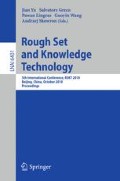Abstract
In this paper we discuss the conceptual reduction of fuzzy dual concept lattices. Three pairs of operators in a fuzzy formal context are introduced. Based on the proposed operators,we present three types of variable threshold dual concept lattices. The properties and the relations of them are discussed. The result shows that the number of concepts in variable threshold dual concept lattices is less than that in fuzzy dual concept lattices, and the important concepts are preserved.
Access this chapter
Tax calculation will be finalised at checkout
Purchases are for personal use only
Preview
Unable to display preview. Download preview PDF.
References
Belohlavek, R., Vychodil, V.: Reducing the size of fuzzy concept lattices by hedges. In: The IEEE International Conference on Fuzzy Systems, Nevada, USA, pp. 663–668 (2005)
Belohlavek, R., Dvorák, J., Outrata, J.: Fast factorization by similarity in formal concept analysis of data with fuzzy attributes. Journal of Computer and System Sciences 73, 1012–1022 (2007)
Burusco, A., Gonzalez, R.F.: The study of the L-fuzzy concept lattice. Mathware and Soft Computing 1(3), 209–218 (1994)
Elloumi, S., Jaam, J., Hasnah, A., Jaoua, A., Nafkha, I.: A multi-level conceptual data reduction approach based on the Lukasiewicz implication. Information Sciences 163, 253–262 (2004)
Erné, M., Koslowski, J., Melton, A., Strecker, G.E.: A primer on Galois connections. In: Papers on General Topology and Applications Seventh Summer Conference Annals of the New York Academy of Sciences, vol. 704, pp. 103–125 (1993)
Fan, S.Q., Zhang, W.X., Xu, W.: Fuzzy Inference based on fuzzy concept lattice. Fuzzy sets and systems 157, 3177–3187 (2006)
Ganter, B., Wille, R.: Formal Concept Analysis, Mathematical Foundations. Springer, Berlin (1999)
Georgescu, G., Popescu, A.: Non-dual fuzzy connections. Archive Math Logic 43(8), 1009–1039 (2004)
Popescu, A.: A general approach to fuzzy concept. Math. Logic Quaterly 50(3), 1–17 (2001)
Zhang, W.X., Ma, J.M., Fan, S.Q.: Variable threshold concept lattice. Information Sciences 177(22), 4883–4892 (2007)
Author information
Authors and Affiliations
Editor information
Editors and Affiliations
Rights and permissions
Copyright information
© 2010 Springer-Verlag Berlin Heidelberg
About this paper
Cite this paper
Song, XX., Zhang, WX., Zhao, Q. (2010). Conceptual Reduction of Fuzzy Dual Concept Lattices. In: Yu, J., Greco, S., Lingras, P., Wang, G., Skowron, A. (eds) Rough Set and Knowledge Technology. RSKT 2010. Lecture Notes in Computer Science(), vol 6401. Springer, Berlin, Heidelberg. https://doi.org/10.1007/978-3-642-16248-0_30
Download citation
DOI: https://doi.org/10.1007/978-3-642-16248-0_30
Publisher Name: Springer, Berlin, Heidelberg
Print ISBN: 978-3-642-16247-3
Online ISBN: 978-3-642-16248-0
eBook Packages: Computer ScienceComputer Science (R0)

